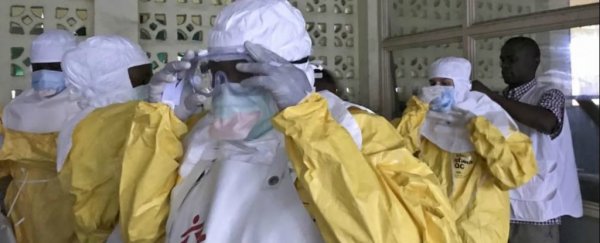Health officials in Congo are anxious to contain the country's deadly Ebola outbreak - which has already spread to an urban area - before the situation gets any worse. But controlling the virus may have just gotten tougher.
On Wednesday, the Doctors Without Borders mission in the Congolese city of Mbandaka announced that three Ebola patients there had left a hospital isolation ward and reentered the general population.
One patient left Sunday, shortly before being discharged, and is still alive, according to the aid group. Two others left overnight Monday; one died outside of quarantine and another was brought back to the hospital and died there.
"In all three cases, every effort was made by staff at the hospital to convince the patients - and their families - not to leave and to continue their treatment," said Brienne Prusak, a press officer for MSF, as Doctors Without Borders is frequently known, in a statement.
Eugene Kabambi, the World Health Organization's spokesman in Congo, told Reuters that two of the patients' families helped them leave the hospital Monday, then brought them to a church.
"It is unfortunate but not unexpected," said WHO spokesman Tarik Jasarevic. "It is normal for people to want the loved ones to be at home during what could be the last moments of life."
Now comes the challenge of determining who the patients may have come into contact with once they left the hospital in the city of more than 1 million people.
There have been 58 confirmed, probable and suspected cases of Ebola - and 27 deaths - as of Tuesday. That number could dramatically increase if the disease were to spread widely in a major city.
Knowing who has been exposed to Ebola is also critical to the effectiveness of the new Ebola vaccine that has been deployed to Congo. Proper use of the vaccine relies on identifying every person who may have come into contact with an infected individual, then working outward from there in what experts call "rings" of people, which includes contacts of contacts.
The idea is to quickly immunize those at highest risk of contracting the virus before they could potentially become infected and spread it themselves. As of this week, the WHO said 628 such contacts had been listed in Congo.
When Ebola hit West Africa in 2014, some of the obstacles that impeded the medical response included lack of trust among communities dealing with outbreaks, and religious practices - such as washing the body of the dead - that spread the disease, which is contagious through bodily fluids.
Community outreach to religious leaders in particular helped familiarize communities with the proper safety protocols.
But lack of trust between patients and doctors is often the reason those sick with Ebola would attempt to evade treatment, which can be intimidating when it involves isolating them from their families and only interacting with medical professionals dressed in hazmat suits.
In previous Ebola outbreaks, patients have also left the hospital despite doctors urging them not to.
MSF is warning against seeing "forced hospitalization" as the solution to the outbreak.
"Patient adherence is paramount," Prusak said. "The quicker patients are admitted, the greater their chance of survival and the greater the chance of limiting the spread of Ebola."
2018 © The Washington Post
This article was originally published by The Washington Post.
